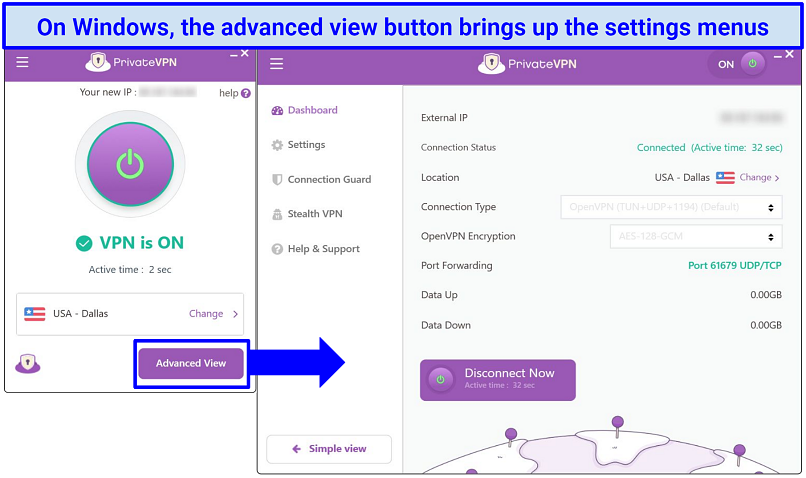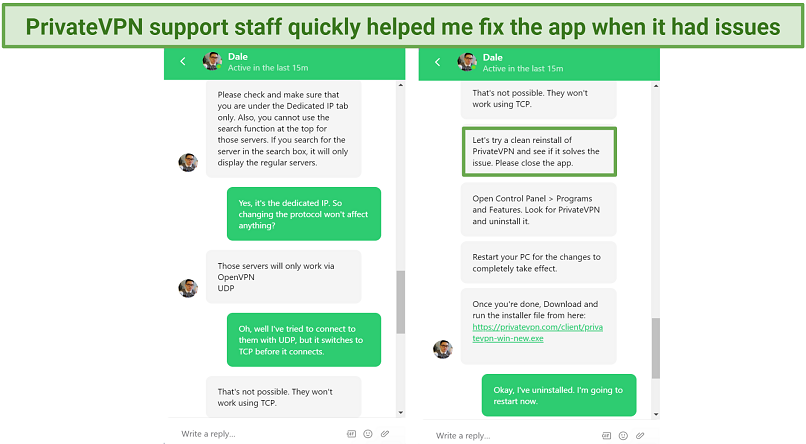PrivateVPN advertises itself as one of the best VPNs for streaming at a low price. It also claims to have great torrenting support, strong security features, and a true no-logs policy. But PrivateVPN is a small company, so can it compete with the biggest VPNs?
To learn the answer, I tested out everything it offers. I tried it out with every major platform to see if it’s one of the best choices for streaming. Extensive speed tests let me know if it can maintain fast browsing, gaming, and torrenting speeds. I also thoroughly researched its logging policy and checked for leaks to test its security.
After my tests, I strongly recommend PrivateVPN. There aren’t many VPNs that can unblock all the platforms it lets you access. Its security is solid, and it never leaked my actual location. Plus, it has one of the best privacy policies and is supported by a 30-day money-back guarantee, so you can confidently try PrivateVPN. But it’s still a smaller company, which has a few drawbacks that mean it’s not for everybody.
Try PrivateVPN Risk-Free Today
Short on Time? Here Are My Key Findings
Pros
Cons
Try PrivateVPN Today
PrivateVPN Features — 2023 Update
9.6
|
💸
Price
|
2 USD/month
|
|
📆
Money Back Guarantee
|
30 Days |
|
📝
Does VPN keep logs?
|
No |
|
🖥
Number of servers
|
200+ |
|
💻
Number of devices per license
|
10 |
|
🛡
Kill switch
|
Yes |
|
🗺
Based in country
|
Sweden |
|
🛠
Support
|
Live Chat |
|
📥
Supports torrenting
|
Yes |
Streaming — Unblocks Tons of Platforms With Excellent Playback
9.8This is one of the best VPNs for streaming. I could unblock tons of libraries with all of the top platforms. There were no issues concerning image quality, load times, or buffering. Its dedicated IPs are just as good as its top competitors’ streaming-optimized servers. Although my tests were performed on my Windows laptop through web browsers, I had no problem unblocking the same platforms on my mobile device.
There was only 1 platform I couldn’t unblock, which is impressive. I did have 1 minor issue where I couldn’t sign in to specific platforms while connected to PrivateVPN. However, customer support recommended I reinstall the app. After that, everything worked great, and I had no issues logging in to any of the streaming channels I subscribed to.
Unblocked: Netflix, Disney+, Hulu, HBO Max, Amazon Prime Video, BBC iPlayer, and more
PrivateVPN works great with Netflix, and only a few VPNs unblock more libraries. I started by testing all of the dedicated IPs, which it recommends for unblocking platforms. 11 could access entire libraries. I also tried 4 regular servers and could unblock 1 more full region of content.
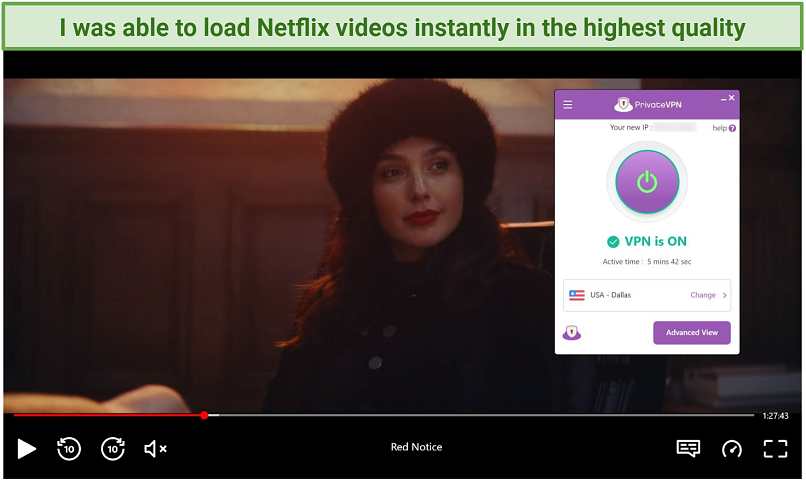 I didn't experience any buffering issues watching fast-paced movies with PrivateVPN
I didn't experience any buffering issues watching fast-paced movies with PrivateVPN
I accessed full Netflix libraries in the following countries:
| United States |
Canada |
United Kingdom |
Australia |
| Spain |
Brazil |
Italy |
India |
| Finland |
Sweden |
Netherlands |
Norway |
Some of the servers couldn’t unblock entire libraries. Locations in France, Japan, Switzerland, Poland, Germany, the Czech Republic, and New Zealand only let me access Netflix Originals. This is a version of the site that only has content Netflix owns. This is pretty common, and I don’t see it as a huge negative because Netflix has been working hard to block more VPNs.
I could unblock Disney+ with dedicated servers from the US, Canada, Italy, the UK, and Australia. Accessing the US library was actually the toughest. I was blocked on Chrome and Edge browsers with the New York server. Luckily, the Los Angeles dedicated server let me sign in with zero issues. I was stopped when I tested the location from Germany. However, it’s a regular server that isn’t optimized for unblocking platforms.
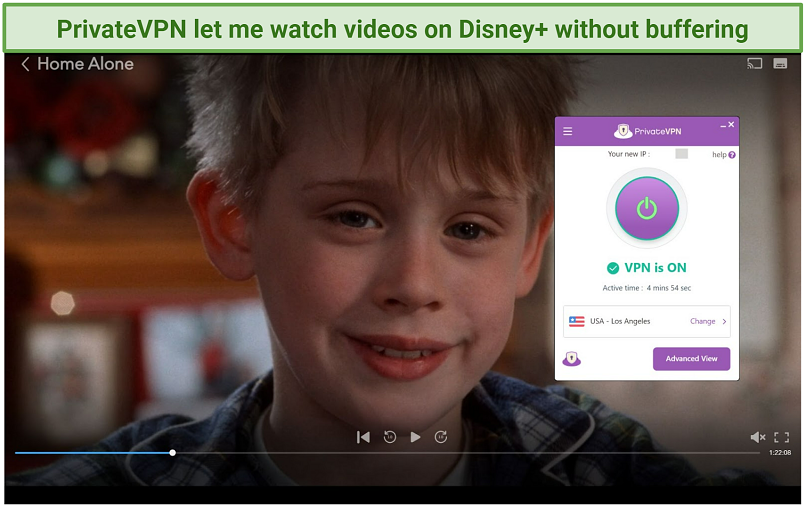 Even on distant servers, I only had to wait 5 seconds for videos to load in HD
Even on distant servers, I only had to wait 5 seconds for videos to load in HD
Hulu was easy to unblock with both dedicated servers from the US. I could also access it with the regular Dallas server, which I appreciate because it’s the server closest to me.
 Unfortunately, there are no VPNs that can get around Hulu's ads
Unfortunately, there are no VPNs that can get around Hulu's ads
I had some minor issues signing in to HBO Max before PrivateVPN’s support staff helped me. There was no error screen, but I couldn't sign in, even though I was positive my password and email address were correct. The live chat agent recommended I reinstall PrivateVPN, which fixed all my issues.
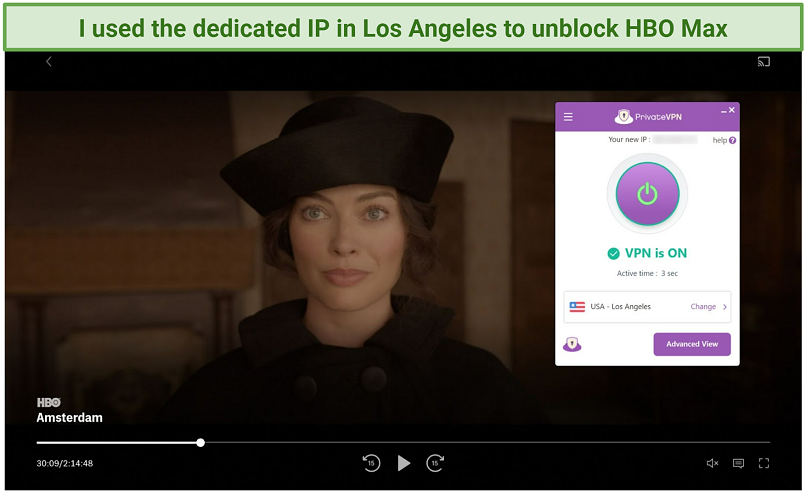 Dedicated IPs should connect via the OpenVPN UDP protocol — reinstall the app if it displays TCP
Dedicated IPs should connect via the OpenVPN UDP protocol — reinstall the app if it displays TCP
I could access Amazon Prime Video with 8 different PrivateVPN locations. This let me watch libraries from the US, the UK, Australia, France, Italy, Switzerland, Germany, and Japan. The only time I was blocked was with a dedicated IP from Spain, which gave me an error screen that stated Amazon detected my VPN.
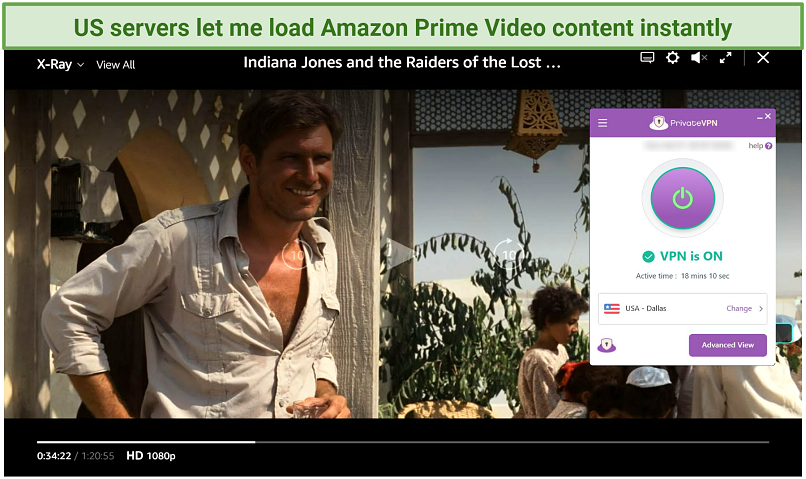 I was happy there wasn't any buffering even on regular servers
I was happy there wasn't any buffering even on regular servers
I could also unblock BBC iPlayer, Peacock, Sky GO, ESPN+, ITV Hub, and DAZN Canada. Most VPNs can’t even access DAZN’s website, so that one impressed me. Streaming videos buffer-free on P2P streaming services like PopcornTime through Kodi was also easy.
Streaming copyrighted materials is illegal, and I don’t recommend it. Please make sure you only access copyright-free movies and shows on peer-to-peer streaming networks.
Blocked By: Hotstar
Hotstar was the only platform I couldn’t unblock. I didn’t expect that because PrivateVPN has dedicated servers in several countries where it’s available, including Canada, the US, and India.
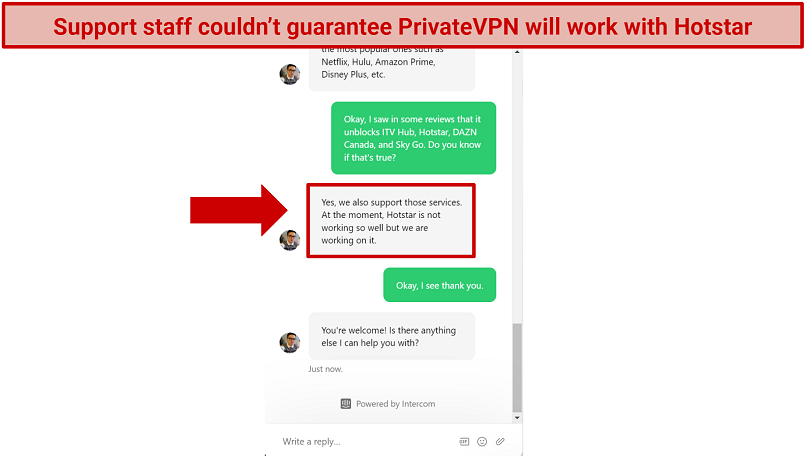 It's worked with the service in the past, so I believe it will again in the future
It's worked with the service in the past, so I believe it will again in the future
Overall, PrivateVPN is one of the best VPNs for streaming. The dedicated IPs are excellent at unblocking platforms. However, there are a few services that can access more Netflix libraries. And I did have that one minor issue where I had to reinstall. But other than those minor issues, PrivateVPN is great for uninterrupted streaming.
Try PrivateVPN for Streaming Today
85% Off
Get 85% off your PrivateVPN plan today!
Money-Back Guarantee: 30 Days
And get 24 months completely free!
Speeds — Decent Speeds That Hold up at Long Distances
8.8PrivateVPN isn’t superfast, but I’ve tested much slower VPNs. I performed all my tests on a Microsoft Surface Laptop running Windows 10. PrivateVPN runs on an HQN (high-quality network), which should make it faster. Unfortunately, it still slowed me down quite a bit, even on nearby locations.
These are the 3 categories I looked at during my speed tests:
- Download speed lets you know how quickly you can receive information. This is important for activities like torrenting and loading web pages.
- Upload speed is the opposite. It tells you how long it takes to send information. You need good rates to quickly upload videos on YouTube or make posts on social media.
- Ping is how long it takes your data to travel. This is essential for online gaming because it lets you know how quickly the network can respond to your inputs (or button presses).
PrivateVPN has several customization options, including encryption levels. I was surprised I got slightly better speeds with the higher 256-bit encryption, so I recommend sticking with that. You can also expect your speeds to be about 14% slower when you enable Stealth (making your VPN traffic appear like regular traffic).
So the following tests were done with 256-bit encryption with Stealth toggled off. Below you’ll see a chart that shows 5 speed test results from the Los Angeles server using each of the available protocol options.
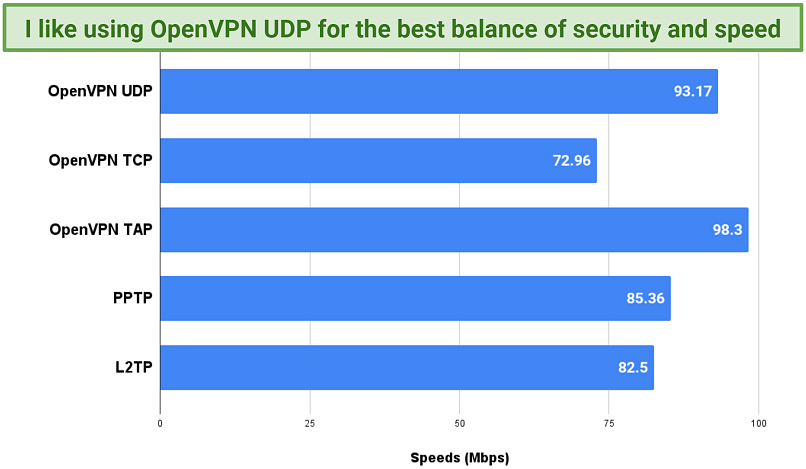 OpenVPN UDP is the default protocol and the only one that works with dedicated IPs
OpenVPN UDP is the default protocol and the only one that works with dedicated IPs
OpenVPN TAP was the fastest protocol in my tests, but the message “NOT RECOMMENDED” is displayed beside it in the app. I asked why on the live chat, and a support agent said: “...it would just be redundant to use it since the tap adapter is already a built-in component of the VPN app.”
They told me it shouldn’t be a security risk or cause any other problems. However, I decided to stick with OpenVPN UDP for the rest of my tests. It gave me the second-best speeds, and it’s the protocol you must use with dedicated IPs. So it’s the one I use the most often anyways.
These are the results of my speed tests with dedicated IPs:
|
Distance |
Download |
Upload |
Ping |
| Base (Austin, TX) |
0 km |
302.38 Mbps |
231.04 Mbps |
4 ms |
| Los Angeles (US) |
2,215 km |
93.17 Mbps (69% drop) |
233.76 Mbps (1% increase) |
39 ms |
| Toronto (Canada) |
2,596 km |
85.02 Mbps (72% drop) |
250.95 Mbps (8% increase) |
45 ms |
| New York (US) |
2,802 km |
61.99 Mbps (80% drop) |
181.84 Mbps (21% drop) |
57 ms |
| London (UK) |
7,905 km |
141.23 Mbps (53% drop) |
283.54 Mbps (19% increase) |
113 ms |
| Sao Paulo (BR) |
8,090 km |
123.04 Mbps (59% drop) |
6.63 Mbps (97% drop) |
150 ms |
| Paris (FR) |
8,195 km |
56.95 Mbps (81% drop) |
127.35 Mbps (45% drop) |
121 ms |
| Zurich (CH) |
8,674 km |
61.65 Mbps (80% drop) |
172.04 Mbps (26% drop) |
138 ms |
| Tokyo (JP) |
10,537 km |
55.59 Mbps (82% drop) |
146.02 Mbps (37% drop) |
143 ms |
| Sydney (Aus) |
13,621 km |
108.71 Mbps (64% drop) |
263.42 Mbps (22% increase) |
191 ms |
| Mumbai (IN) |
14,428 km |
53.32 Mbps (82% drop) |
150.90 Mbps (35% drop) |
242 ms |
Even the nearby servers dropped my speeds significantly. The London server actually gave me the best download speed, even though it’s nearly 8,000 km away. My upload speeds were much better, with a few servers increasing it. The ping held up pretty well too. I was impressed that every server I tested in North America kept it below 100 ms.
My tests on regular servers gave me better results:
|
Distance |
Download |
Upload |
Ping |
| Dallas (US) |
313 km |
221.08 Mbps (27% drop) |
95.08 Mbps (59% decrease) |
11 ms |
| Chicago (US) |
1,803 km |
153.86 Mbps (49% drop) |
226.03 Mbps (2% drop) |
32 ms |
| Paris (FR) |
8,195 km |
133.52 Mbps (56% drop) |
219.52 Mbps (5% drop) |
121 ms |
| Tokyo (JP) |
10,537 km |
121.09 Mbps (60% drop) |
215.04 Mbps (7% drop) |
144 ms |
| Sydney (AUS) |
13,621 km |
114.66 Mbps (62 % drop) |
231.29 Mbps (0.001% increase) |
191 ms |
I wasn’t surprised that the closest server gave me the best speeds. It wasn’t the best result since I’ve tested some VPNs that only lower my speeds by 10% or less on nearby servers. However, I was glad that the regular servers were much faster at long distances. For example, the Paris server was almost twice as fast as the dedicated IP in the same city.
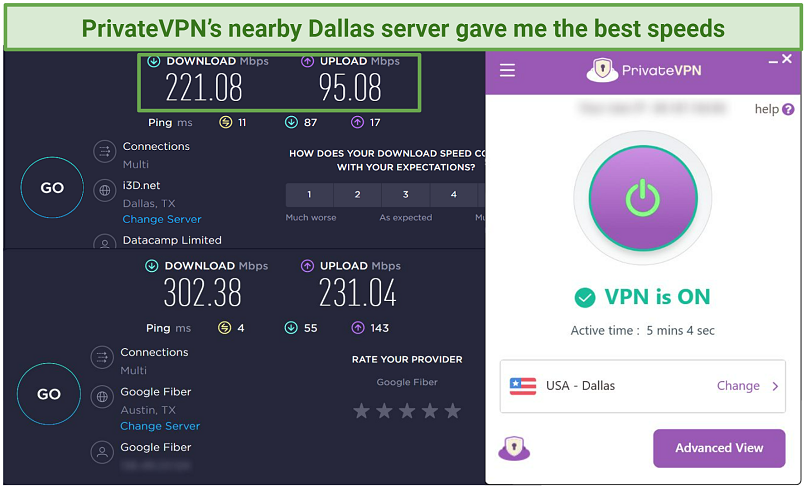 My connection speed only lowered by 27% connected to PrivateVPN’s Dallas server
My connection speed only lowered by 27% connected to PrivateVPN’s Dallas server
PrivateVPN doesn’t have the most extensive server network, so I’m guessing its speeds are slower than many of its competitors because of overcrowding. It also lets you have many simultaneous connections, which could make its servers even more crowded. I hope it enables you to see the server load in the future. For now, there’s no way to know how many people are on any of its servers. I’d also like it to add the Wireguard protocol for better speeds.
It’s also too bad that normal servers are faster than dedicated IPs. Dedicated IPs worked better for streaming, gaming, and torrenting in my tests. All these activities work best at fast speeds. But you should still be able to do all of these things at a comfortable speed unless you have a slow base connection. Overall, PrivateVPN is okay when it comes to speeds, but it definitely has room for improvement.
Try PrivateVPN Today
Are PrivateVPN’s Speeds Fast Enough for Gaming? Yes On Nearby Servers
9.6I could play online games while connected to one of PrivateVPN’s dedicated IPs. In my first test, I tried the Dallas server. It’s the closest one to me, and it only had a ping of 10 ms. You want a ping rate between 50-85 ms for gaming, so your character can respond to your button presses close to instantly.
Even though the ping was low, the game was laggy with the regular server from Texas. After clicking my mouse, it took about half a second for the gun to fire. This meant I couldn’t enjoy the game, and I kept dying soon after respawning.
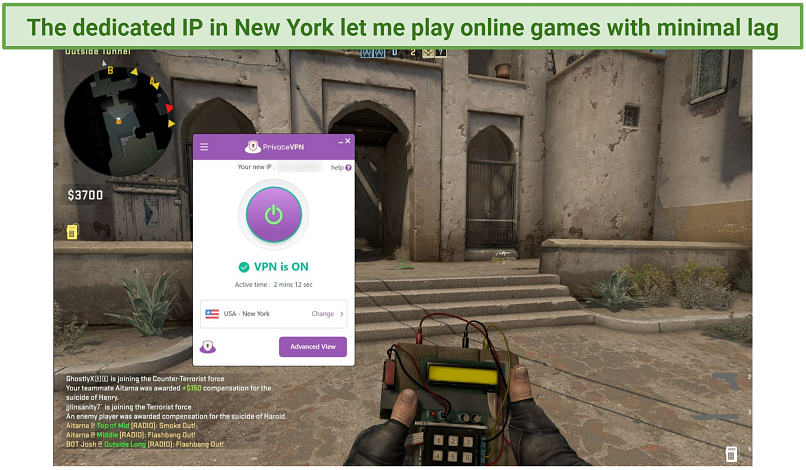 It only took 10 seconds to find a match
It only took 10 seconds to find a match
With the dedicated IP I tested, there was practically no lag. This was even though the ping rate was 4 times higher (around 42 ms). The gameplay paused briefly 1 time, but that can happen to me even without a VPN. I’m not great at the game, but I was able to plant a bomb to help my team win once the game was running smoothly.
I also tested a dedicated IP in the UK that’s about 7,905 km away from me. The ping was over 100 ms at that distance, and the gameplay was glitchy. I ended up falling through the floor and experiencing weird problems that made the game unplayable. However, that’s normal, and I was impressed with PrivateVPN’s gaming results overall. There aren’t many VPNs that let you play online games lag-free, even with a nearby server.
Try PrivateVPN for Gaming Today
Server Network — Reliable Connections on a Limited Number of Servers
9.2PrivateVPN has a small server network, but it gives you a nice mix of locations worldwide. The connections are reliable too. I only had a few issues when I used the L2TP protocol, which wouldn’t let me connect to Sao Paulo or Los Angeles. But it’s not a protocol I recommend since it’s slower and less secure than OpenVPN.
While there are only 200 servers in 63 countries, it has 7,000+ IPs in total. The IPs are rotated randomly when one is at full capacity. The table below gives you a breakdown of how many locations are available in each continent:
| Continent |
Number of Locations |
Countries |
| North America |
18 |
Canada (3 locations), Costa Rica, Mexico, Panama, and the US (12 locations) |
| South America |
8 |
Argentina, Brazil, Chile, Colombia, Costa Rica, Mexico, Panama, and Peru |
| Europe |
41 |
Austria, Belgium, Brussels, Bulgaria, Croatia, Cyprus, Czech Republic, Denmark, Estonia, Finland, France, Germany (2 locations), Greece, Hungary, Iceland, Ireland, Isle of Man, Italy, Latvia, Lithuania, Luxembourg, Malta, Moldova, Netherlands, Norway, Poland, Portugal, Romania, Russia (2 locations), Serbia, Slovakia, Spain, Sweden (2 locations), Switzerland, Turkey, the UK (2 locations), and Ukraine |
| Asia |
14 |
Hong Kong, India (2 locations), Indonesia, Japan, Malaysia, Philippines, Singapore, South Korea, Taiwan, Thailand, UAE, Israel, and Vietnam |
| Oceania |
5 |
Australia (4 locations), and New Zealand |
| Africa |
2 |
Nigeria and South Africa |
There are only 7 virtual servers. A virtual location means the server is in a different location than the IP it gives you. This shouldn’t cause any security issues, but it could give you worse speeds if it’s farther away than you expected. The virtual servers are Argentina, Chile, Colombia, Bangalore, Mexico City, Panama City, and Lima.
Most of PrivateVPN’s servers are rented. The vast majority of VPNs rent servers as it costs much more for them to own their infrastructure. As long as a VPN has a solid no-logs policy, this shouldn’t create any privacy issues. But it does give me added peace of mind when a VPN cuts out this middleman. I reached out through PrivateVPN’s live chat and found that it owns some of its servers.
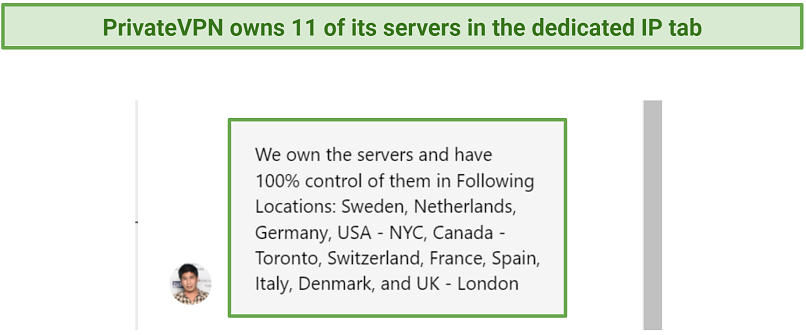 There are 15 dedicated IPs in total in 14 countries
There are 15 dedicated IPs in total in 14 countries
I do hope that PrivateVPN upgrades to RAM-based servers eventually. These servers delete all the information on them each time they reboot for added privacy. But I understand that PrivateVPN is a smaller service, so it can’t compete with the massive networks and advanced technology of its largest competitors. The number of locations should be enough for most people. But you can find VPNs with many more locations, especially in Africa, South America, or the Middle East.
Try PrivateVPN Today
Security — Secure but Missing Some Extra Features
9.2PrivateVPN passed all of my leak tests thanks to its military-grade encryption. By default, it uses 128-bit GCM encryption. I recommend switching to 256-bit GCM since it’s harder to crack and it was faster in my tests. CBC encryption is also available, but GCM is considered to be a little safer. Plus, I didn’t notice any speed differences, so I’d stick with GCM. PrivateVPN also uses its own DNS servers, which cuts out a go-between, making it more secure.
It never revealed my actual location during tests with servers from the US, Australia, the UK, Sweden, and Japan. I did find one US server that gave me a different location than the one listed. However, it wasn’t a big deal since it still unblocked the full Netflix US library, HBO Max, and every other US platform I tested. IPv6 and DNS leak protection is automatically enabled, but WebRTC leak protection isn’t available. So, you’ll have to take care of that in your browser’s settings. It’s a little inconvenient, so I hope it’s added in the future.
 I was surprised, as the LA server isn't listed as a virtual location on PrivateVPN's website
I was surprised, as the LA server isn't listed as a virtual location on PrivateVPN's website
The kill switch works as advertised, but I wish it was available for more than just the Windows and Mac apps. I tested it by switching servers with a browser open. It blocked my connection every time, so I know it’s effective. This essential feature ensures your IP and data are never vulnerable, so I wouldn’t recommend using a VPN without one. Just make sure you turn it on since it’s not enabled by default.
Application guard lets you add apps to a list that are automatically disconnected when you turn off the VPN. It’s useful for things like a banking app that you wouldn’t want to leave on without protection. The last security feature it offers is Stealth VPN. This hides your VPN use, so you can use PrivateVPN on restricted networks. It utilizes the Shadowsocks proxy to do this. Support staff recommended you only use it if you’re in a country with heavy internet censorship.
There are also 5 protocols available:
- OpenVPN UDP is the best protocol for unblocking websites. It’s also super secure since each version of OpenVPN is open-source. This means it's tested for vulnerabilities by people all around the world, which can then be fixed.
- OpenVPN TCP is a little slower than UDP and uses more data. It’s good to have as a backup, but UDP is the better choice for most activities.
- OpenVPN TAP isn’t recommended by PrivateVPN, so I don't know why it’s available. I asked support what use it has, but they couldn’t answer me.
- L2TP was the fastest protocol in my tests. However, it’s older and less secure than OpenVPN. Plus, I ran into connection issues with it, so I’d stick with OpenVPN.
- PPTP is even less secure than L2TP. Most people won’t need it, but some people use it with an outdated operating system.
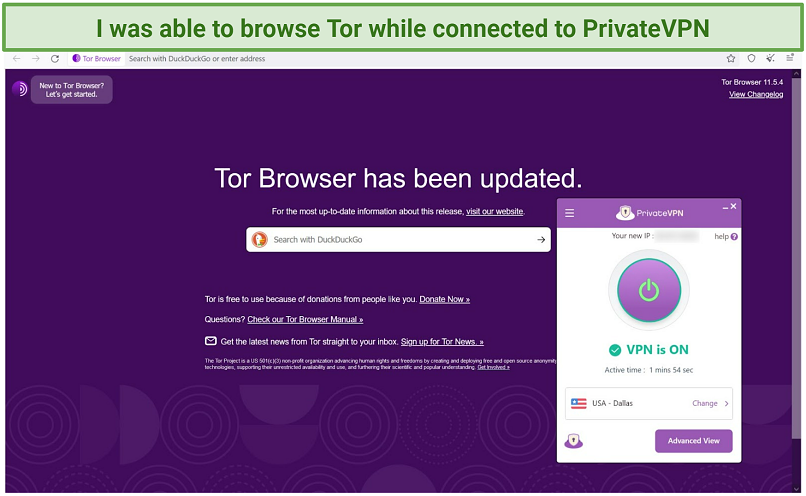 Some ISPs block Tor, so you can use PrivateVPN to access it
Some ISPs block Tor, so you can use PrivateVPN to access it
It’s unfortunate that PrivateVPN doesn’t have some extra security features many of its competitors have. For example, there’s no double VPN or WiFi protection. In addition, there’s no split tunneling, but you can connect to PrivateVPN’s SOCKS5 and HTTP proxy servers on your browser. That lets you change locations on your browser while the rest of your apps use your normal internet connection. But it’s not as convenient as split tunneling and doesn’t offer encryption.
Overall, PrivateVPN is secure. It always hid my true location and protected my vital information. It could be improved by adding some of its competitors' extra security features.
Protect Your Data With PrivateVPN
Privacy — Stores No Logs but It’s in a 14-Eyes Country
9.8PrivateVPN is located in Sweden, but its great no-logging policy means that’s not an issue. Sweden is a part of the 14-Eyes Alliance. This is an agreement between governments to share information about their citizens. Plus, it’s not the most privacy-friendly country (there have been ongoing issues with its data retention laws). But PrivateVPN only stores the small amount of information you give them. So, they’ll have nothing to share if any government demands data on its customers.
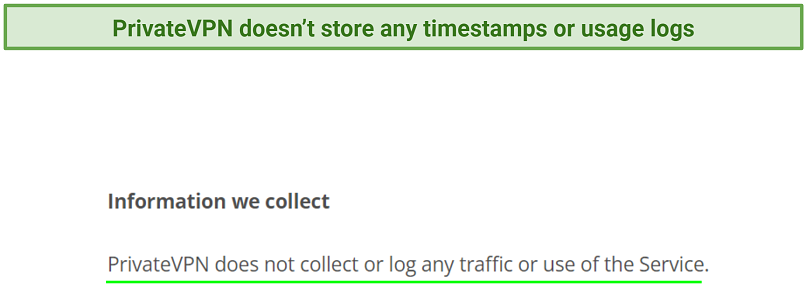 Most VPNs store some anonymized logs, so I'm impressed that PrivateVPN only keeps your email address
Most VPNs store some anonymized logs, so I'm impressed that PrivateVPN only keeps your email address
PrivateVPN only retains customer email addresses and passwords. Since payments are processed by external parties, PrivateVPN does not have access to any financial data. To maintain total anonymity, users can opt to create a new email address for signing up.
One issue is PrivateVPN’s policy hasn’t been verified by an independent audit or a public court case. Other VPNs pay reputable companies to perform audits on their policies, which prove that they’re followed. I understand that PrivateVPN is a smaller company, but I hope this is done in the future. A court case could also verify the policy, but the company can’t control that. On the other hand, PrivateVPN has a good reputation, and I trust them to be responsible with my data.
Finally, it collaborates with a third-party entity named Intercom that supplies the backbone for its live chat functionality. While I don't perceive it as a major privacy issue, it's always advisable not to disclose any sensitive data to any company's support staff. The support team at PrivateVPN confirmed that Intercom doesn't have the capacity to view your discussions via its chat service.
Try PrivateVPN Today
Torrenting — Great Speeds on P2P Networks
8.0PrivateVPN is a great choice for torrenting. Most VPNs drop my speeds a lot when I try torrenting. Without a VPN, I can usually reach a speed of around 12 MB/s during downloads. I’ve tested tons of VPNs that drop me down to about 1 MB/s or less. With PrivateVPN, I could reach 4 MB/s, letting me download a 1.6 GB file in less than 15 minutes. This was with a small number of seeders too.
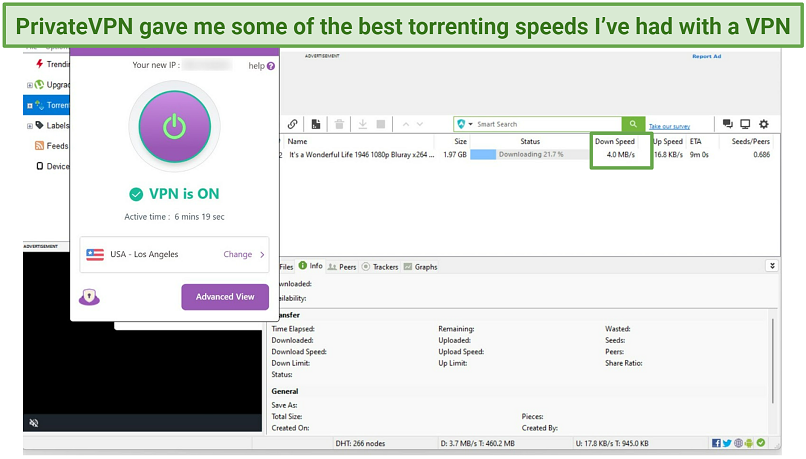 I found its dedicated IPs twice as fast as regular servers
I found its dedicated IPs twice as fast as regular servers
PrivateVPN's port forwarding is automatically enabled for every server, resulting in faster torrenting speeds. A member of the support team informed me that dedicated IPs allow access to "almost all" ports, while standard servers only allow access to one. This could explain the significant speed difference between dedicated IPs and regular servers.
Torrenting is legal in most parts of the world, but it’s illegal to download copyrighted files. My team and I don’t condone any illegal activities. Please read up on the rules and regulations where you live before you decide to torrent. If you want to stay safe on P2P networks, PrivateVPN is one of the best torrenting options.
Try PrivateVPN for Torrenting Today
Does PrivateVPN Work in China? Sometimes
Due to increased regulation of VPNs in China, PrivateVPN can’t guarantee it will work in the country. If you want to use it in China, it’s best to download the VPN before you enter the country. Once there, you should use one of the OpenVPN protocols and toggle on the Stealth feature.
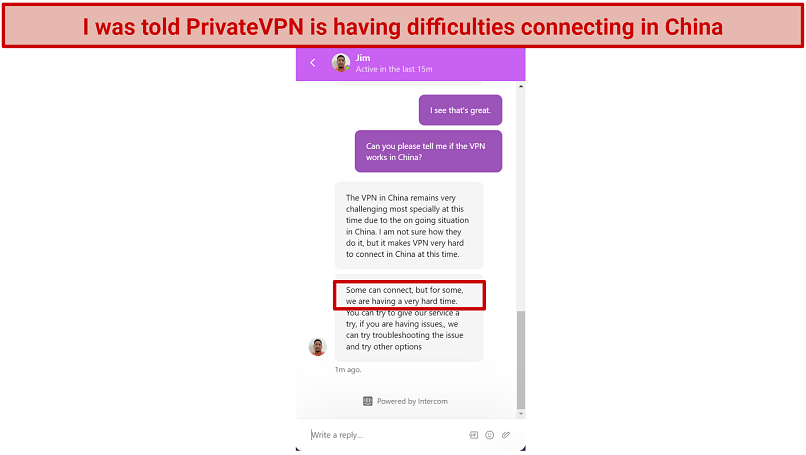 You'll get the best speeds if you use nearby servers in Hong Kong
You'll get the best speeds if you use nearby servers in Hong Kong
Typically, the Chinese government prefers to prohibit technology itself rather than prosecuting individuals who utilize VPNs. Nevertheless, neither my team nor I endorse any unlawful activities. We strongly suggest that you familiarize yourself with the legal landscape of your current country before opting to use a VPN.
Try PrivateVPN Today
















